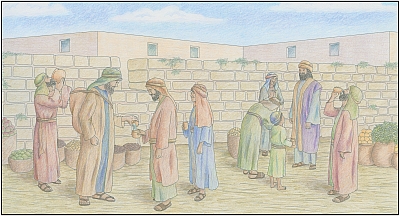At major-league baseball games, it is not unusual to hear the cry of a vendor selling his wares as he moves through the stands. Among the choices are salty peanuts, popcorn, and cold bottled water. The vendor makes the water available to anyone who is thirsty, but of course, a price is involved. To receive the bottle of water, a person must pay the price asked by the vendor. It’s not unusual, however, for someone to simply pay the price and pass the water to a friend or family member as a gift.
This example can help us understand the meaning of the vendor’s call in Isaiah 55:1 as well as grasp the spiritual meaning of the Prophet Isaiah’s words.
Isaiah 55:1:
Ho, every one that thirsteth, come ye to the waters, and he that hath no money; come ye, buy, and eat; yea, come, buy wine and milk without money and without price.
Our Western minds may puzzle over this verse: “How can one come and buy and not pay anything? Certainly this vendor must make a profit!” But we must remember that the Eastern manner of expression and thinking is much different than the Western. The Bible was written in terms of the Eastern man’s thinking. The Bible is the Word of God, but it is couched in the Eastern way of life. Once we understand the custom involved here and that the vendor’s cry is a figure of speech, the meaning of Isaiah 55:1 gets clearer.
Fred H. Wight in Manners and Customs of Bible Lands gives some background about this vendor, or water seller, here in Isaiah. He explains that for six months of the year there is no rain. Water then becomes very scarce in many parts of the East. During these times, the water seller may be heard in the streets or the marketplace crying, “Ho, ye thirsty ones, come ye and drink.” Wight explains that sometimes, though, the peddler’s call is different:
…There have been times when a philanthropic person has paid the water carrier for all his supply of water and thus let him offer it free of charge to those who need it. Then he will call forth: “Ho, ye thirsty ones, come and drink today for nothing, for nothing!” Such words remind us of the prophetic invitation of Isaiah: “Ho, every one that thirsteth, come ye to the waters, and he that hath no money; come ye, buy …without money and without price” (Isaiah 55:1).
Bishop K. C. Pillai taught our ministry much about this custom. In his teachings and in chapter 3 of Orientalisms of the Bible, Volume I, he provides details that make this custom and its spiritual application come alive.
Rather than receiving gifts on his birthday, anniversary, or some other special occasion as is the custom in the West, the Easterner gives gifts as an expression of his thanks to God for another year of life. In the East, the best gift that can be given in appreciation is to quench the thirst of someone. Blessing thirsty people is a way of showing gratitude to God.
Matthew 10:42:
And whosoever shall give to drink unto one of these little ones a cup of cold water only in the name of a disciple, verily I say unto you, he shall in no wise lose his reward.
A tangible way the Easterner can express his gratitude to God Whom he cannot see is to buy the vendor’s water, milk, or wine to bless others whom he can see. When someone has a birthday, for example, he goes to the seller and buys his whole stock to “sell without price” to celebrate the occasion. The seller changes his tune from “Come ye, buy …” to “Come ye, buy…without money and without price.”
Why does the seller still say “buy”? In the Eastern way of thinking, the vendor is still selling. The goods aren’t free; the celebrant paid the price, and the person who gets it is still buying it, but “without price.” The man celebrating stands there to make sure that the vendor sells rightly—that he takes no additional money. As the thirsty people come and buy, they thank the man who is celebrating. Everyone fills their containers, walks to the man, bows, and says, “Thank you, sir, for paying the price.”
Isaiah 55:1 is part of a prophecy regarding Israel and the coming Messiah. Bishop Pillai’s chapter has a beautiful conclusion, which gives us the spiritual application of “come, buy wine and milk without money and without price.”
The whole world has sinned and come short of the glory of God. Man cannot pay the price for his deliverance. So, God sent His only begotten Son into the world to pay the price for us. He took our place on the cross. He paid our debt….
Through his sacrificial death, Christ purchased our salvation….
Because of the price Christ paid, we can drink of “living water” and never thirst again.
John 4:14:
But whosoever drinketh of the water that I shall give him shall never thirst; but the water that I shall give him shall be in him a well of water springing up into everlasting life.
The prophetic words of Isaiah regarding this spiritual water still sound out to the nations today: “Ho, every one that thirsteth, come ye to the waters …”!
This is a reprint from the July/August 2013 issue of The Way Magazine.
Copyright© 2013 by The Way International. All rights reserved.
For more information on subscribing to The Way Magazine, Click Here

